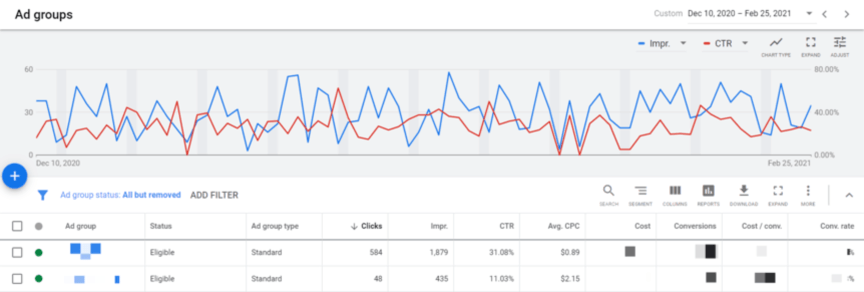-
 6 min. read
6 min. read
-
 Matthew Gibbons
Matthew Gibbons Lead Data & Tech Writer
Lead Data & Tech Writer
- Matthew is a marketing expert focusing on the SEO & martech spaces. He has written over 500 marketing guides and video scripts for the WebFX YouTube channel. When he’s not striving to put out some fresh blog posts and articles, he’s usually fueling his Tolkien obsession or working on miscellaneous creative projects.
Running a pay-per-click (PPC) advertising campaign is a process. You first have to choose your keywords, and then bid on them, and then set up your ads and targeting settings. But it doesn’t end there. In fact, the bulk of the process comes down to monitoring results. Specifically, you need to dedicate plenty of time to tracking some key PPC metrics that will help you understand how to optimize your marketing.
But how exactly does PPC tracking work, and which metrics should you keep up with? We’ll answer both of those questions below. Read on to learn more, and then consider partnering with WebFX — the PPC agency with over 28 years of experience — to get help putting all this information into action. Just call 888-601-5359 or contact us online today!
We foster and form long-term partnerships so that your business has long-term results.
Over 90% of WebFX clients continue partnering with us into year 2 of their campaign.
Hear from Our Happy Customers

What is PPC tracking?
Put simply, PPC tracking is the process of monitoring the results of your PPC campaigns.
Specifically, it involves tracking several key performance indicators (KPIs), or numbers that show how well different ads and campaigns perform.
Why is PPC tracking important?
Tracking PPC KPIs is vital to the success of your campaign. If you choose to ignore your PPC campaign once your ads are up and running, you won’t meet with very positive results. That’s because PPC requires constant fine-tuning to be a beneficial strategy. Your PPC will likely start out with plenty of flaws.
When you first create your ads, you play a bit of a guessing game regarding what will work and what won’t. Though estimated keyword metrics like CPC and popularity can give you a rough idea, you won’t know for sure until you see your campaign in action. The good news is, Google Ads — the platform through which you can create and manage PPC ads on Google — gives you access to plenty of informative metrics about your campaigns.  By looking at different PPC metrics, you can see which ads drive results and which ones don’t. That insight allows you to pause or improve the faulty ones, and to devote a larger portion of your budget to the successful ones. The longer your reoptimization process goes on, the better your PPC will become, and the more successful your overall marketing plan will be.
By looking at different PPC metrics, you can see which ads drive results and which ones don’t. That insight allows you to pause or improve the faulty ones, and to devote a larger portion of your budget to the successful ones. The longer your reoptimization process goes on, the better your PPC will become, and the more successful your overall marketing plan will be.
Get your digital advertising tips straight from the experts.
Read the Blog Post & Watch the Video

5 PPC KPIs to track
Google Ads allows you to view a variety of PPC KPIs, but several are worth tracking.
Here are five PPC metrics to keep up with for PPC marketing:
1. Impressions and impression share
Impressions refer to the number of times Google has displayed an ad or campaign in a search. That is, if Google displays a given ad in search results 10 times on a given day, that ad has 10 impressions for that day. While it’s good to keep up with how many impressions your campaigns get, a more helpful version of the metric is impression share. Impression share is your total impressions divided by how many impressions you were eligible for.
Google Ads will give you this information. So, if your ad was eligible to appear in 50 searches yesterday but only appeared in 10, that means your impression share is 20%. The other 80% of impressions are owned by your competitors. Knowing impression share lets you easily see how much competition you have for a given keyword or campaign.
2. Clicks and click-through rate (CTR)
Clicks refer to how many people clicked on one of your ads. It’s a straightforward metric but not entirely helpful on its own. A more useful way of looking at how many clicks you have is with click-through rate (CTR). CTR divides your total number of clicks by your total number of impressions.
This tells you what proportion of your ad’s viewers ended up clicking on it. A low CTR indicates that your ad isn’t doing a good enough job at drawing people in, so it needs to be more compelling. You can easily find your CTR with our CTR calculator!
3. Conversions and conversion rate
Conversions happen when people not only click on your ad, but also follow through with whatever your ad encourages them to do — usually buying a product or service. While you should keep up with the raw number of conversions, it’s even more important to track conversion rate. Conversion tracking is arguably the most significant PPC metric for you to keep up with. After all, the endgame of all your PPC is to encourage users to convert.
Conversion tracking allows you to see how successful your campaigns are at doing that. To find your conversion rate, divide the number of conversions by the number of clicks. This tells you how many people, out of those who clicked on your ad, ended up converting. A low conversion rate indicates that your landing page needs to do a better job of fulfilling user search intent — that is, it needs to do better at giving users what they’re hoping or expecting to find when they click on your ad. You can find your conversion rate by using our conversion rate calculator!
4. Average cost per click (CPC)
Cost per click (CPC) is a valuable metric to track because it gives you a clear sense of how much you spend on a given ad or campaign. As the name suggests, CPC measures how much you pay each time someone clicks on one of your ads. To find CPC, divide the total cost incurred by a given ad or campaign by the total number of clicks that ad or campaign has earned. The result tells you how much, on average, you pay for each click. You can also use our CPC calculator for a fast answer!
5. Cost per acquisition (CPA)
Cost per acquisition (CPA) — also called cost per conversion or customer acquisition cost (CAC) — measures how much you pay for each conversion that a campaign earns. Like CPC, this metric allows you to see how much your results cost. To calculate CPA, divide the total cost of a campaign by the number of conversions that campaign drives. The resulting number will be the average amount of money you pay for each conversion.
If a campaign has a high CPA, it means it’s not as good as others at converting users. You can also find CPA using our CPA calculator!
Our digital marketing campaigns impact the metrics that improve your bottom line.
See More Results
WebFX has driven the following results for clients:
$6 billion
In client revenue
24 million
Leads for our clients
7.14 million
Client phone calls
Get help with your conversion tracking today from WebFX
Now that you know to track your PPC metrics, the next question is how to improve them. If you’re struggling to drive better results with your PPC campaign, WebFX can give you a hand! With over 1,100 client testimonials, we’re the agency businesses trust to boost their marketing. With our PPC services, you’ll get help optimizing each of the KPIs listed above and driving up conversions. You’ll also receive a dedicated account representative to keep you informed on everything we do for your marketing! To get started with us, give us a call at 888-601-5359 or contact us online today!
-
 Matthew is a marketing expert focusing on the SEO & martech spaces. He has written over 500 marketing guides and video scripts for the WebFX YouTube channel. When he’s not striving to put out some fresh blog posts and articles, he’s usually fueling his Tolkien obsession or working on miscellaneous creative projects.
Matthew is a marketing expert focusing on the SEO & martech spaces. He has written over 500 marketing guides and video scripts for the WebFX YouTube channel. When he’s not striving to put out some fresh blog posts and articles, he’s usually fueling his Tolkien obsession or working on miscellaneous creative projects. -

WebFX is a full-service marketing agency with 1,100+ client reviews and a 4.9-star rating on Clutch! Find out how our expert team and revenue-accelerating tech can drive results for you! Learn more
Try our free Marketing Calculator
Craft a tailored online marketing strategy! Utilize our free Internet marketing calculator for a custom plan based on your location, reach, timeframe, and budget.
Plan Your Marketing Budget
Table of Contents
- What is PPC Tracking?
- Why is PPC Tracking Important?
- 5 PPC KPIS to Track
- 1. Impressions and Impression Share
- 2. Clicks and Click-through Rate (CTR)
- 3. Conversions and Conversion Rate
- 4. Average Cost Per Click (CPC)
- 5. Cost Per Acquisition (CPA)
- Get Help with Your Conversion Tracking Today from WebFX

Maximize Your Marketing ROI
Claim your free eBook packed with proven strategies to boost your marketing efforts.
Get the GuideTry our free Marketing Calculator
Craft a tailored online marketing strategy! Utilize our free Internet marketing calculator for a custom plan based on your location, reach, timeframe, and budget.
Plan Your Marketing Budget





